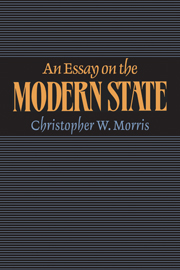4 - Legitimacy
Published online by Cambridge University Press: 05 June 2012
Summary
LEGITIMATE STATES
When are states legitimate? What is the basis of their claimed legitimacy? These questions are evaluative or normative. By contrast, we might wish to know whether a particular state is regarded as legitimate, just as we might want to learn whether a particular novel is thought to be good or whether a candidate for office is believed to be corrupt. These queries are primarily nonnormative and are answered by discovering people's beliefs or attitudes. The broadly sociological accounts, derived from Weber and still influential, that would have us understand the state's legitimacy in terms of the attitudes of subjects are nonnormative in this manner. My primary concerns in this essay are normative, so these sorts of accounts are beside the point. But they are also inherently problematic, as has been pointed out frequently in the philosophical literature: “Attempts to explain the notion of legitimacy of government in terms of the attitudes and beliefs of its subjects have a difficult time avoiding the reintroduction of the notion of legitimacy when it comes time to explain the precise content of the subjects' attitudes and beliefs.” Legitimacy may depend on people's attitudes, but the first question is what attitudes ought we have.
‘Legitimacy’ and its cognates have a variety of related but different senses. The word is derived from the Latin lex and has the same root as ‘legislation’. One sense of ‘legitimate’ is being in accordance with law, or lawful (legality).
- Type
- Chapter
- Information
- An Essay on the Modern State , pp. 102 - 113Publisher: Cambridge University PressPrint publication year: 1998



